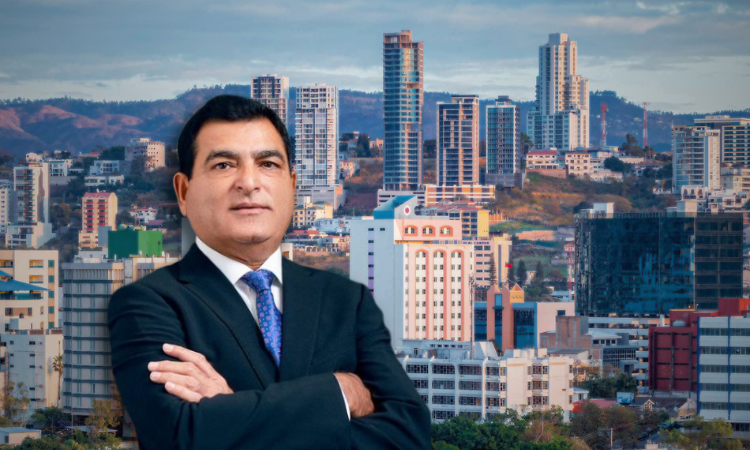Yusuf Amdani of Pakistan first visited Honduras in 1990, on the lookout for a textile-factory location. Fast forward 34 years: he is a Honduran citizen and one of the nation’s most prominent, innovative, and successful entrepreneurs with about 10 factories to his name.
His acquired wisdom from this era is distilled in World of Opportunity, his concise 2023 book (208 pages, 4 hours and 52 minutes of audio). The GK Global founder’s foray into print, albeit laced with venture self-promotion, is substantive and striking. Although seeking to convey optimism, Amdani details Third-World investment’s profound difficulties—ones that justifiably dissuade many investors.
Listen on Apple Podcasts | Listen on Spotify | Watch on BitChute | Watch on YouTube
There are many lessons in the book, subtitled Bringing Sustainable Business to Fragile Economies, and each chapter ends with a convenient bullet-point summary. His touted secret is “creating opportunity,” but there is one overarching conclusion that stands out as inescapable: be prepared to invest for the long haul in infrastructure and culture beyond your own venture. Perhaps given his Pakistani upbringing, he knows that the mere pursuit of lower costs in relatively poor nations, without addressing the broader context, is a recipe for failure. (See the 2003 film Power Trip for the case of a US firm that bought, and then sold, the power grid in Georgia.)
 In other words, Amdani explains how to create your own industrial ecosystems, as he has in Santa Barbara and San Pedro Sula, Honduras, and later in Campeche, Mexico. That way you (1) avoid dependence on government utilities and services and (2) provide a synergistic environment for locals to thrive and embrace productivity. The only way around that presumably is to piggyback on established private infrastructure, the likes of which Amdani has built himself at the Green Valley manufacturing hub and the Altia smart city—although piggybacking would miss much of the value creation.
In other words, Amdani explains how to create your own industrial ecosystems, as he has in Santa Barbara and San Pedro Sula, Honduras, and later in Campeche, Mexico. That way you (1) avoid dependence on government utilities and services and (2) provide a synergistic environment for locals to thrive and embrace productivity. The only way around that presumably is to piggyback on established private infrastructure, the likes of which Amdani has built himself at the Green Valley manufacturing hub and the Altia smart city—although piggybacking would miss much of the value creation.
Inadvertently, Amdani’s use of free ports and favorable tax regimes to build all-encompassing properties is a subtle nod of support for the ZEDEs in Honduras (zones for employment and economic development). Amdani offers nearshoring for US customers and has built de facto nations within nations, incorporating housing, leisure, education, and medicine. In particular, his nonprofit foundation allocates resources and partners with other organizations to further the latter two, and he describes these initiatives at length in World of Opportunity.
Amdani has also taken the time to challenge cultural norms and mold the local workforce to his needs. He notes, for example, that when he first opened up shop in Campeche, locals were accustomed to siestas and only short spurts of employment, enough to get them to a paycheck. The need to nurture human capital towards the right skills, values, and habits—even going so far as to ensure broader worker health—is likely why Amdani is an ardent advocate for efficiency wages. This refers to paying above-market compensation to engender loyalty and enthusiasm and lower staff turnover.
Amdani’s frankness regarding his experiences cuts both ways. It reveals incredible return opportunities, but it also opens the readers eyes to the minefield he has traversed.
For example, Amdani recommends as much as possible avoiding any compromising relationships with government officials—another reason for building your own infrastructure. However, even Amdani has been caught up in US State Department allegations of Supreme Court bribery.
Whether the allegations are true or not, they do not entail any presumption of innocence and are almost certainly politically motivated (they came soon after the release of his book). Unfortunately, the allegations also point to how difficult it is to stay clean in a place like Honduras, which ranks 154th out of 180 countries for corruption perceptions, according to Transparency International.
The poignance and practicality in World of Opportunity, along with the marketing of GK Global’s services, signal the work of a seasoned, battle-hardened businessman. He has done his best to convey value and invite newcomers to follow in his footsteps and find lasting success in overlooked locales. For someone with an eye on Third-World ventures, both in facilitating them and investing in them directly, Amdani’s story is one worth reading and rereading.
 Join us in our mission to foster positive relations between the United States and Latin America through independent journalism.
Join us in our mission to foster positive relations between the United States and Latin America through independent journalism.
As we improve our quality and deepen our coverage, we wish to make the Impunity Observer financially sustainable and reader-oriented. In return, we ask that you show your support in the form of subscriptions.
Non-subscribers can read up to six articles per month. Subscribe here.

